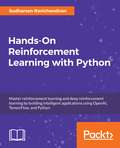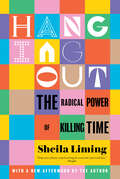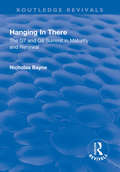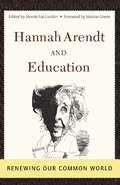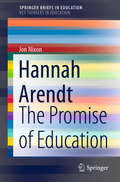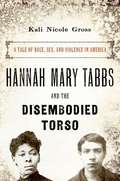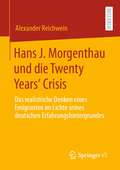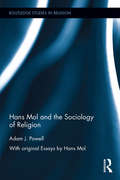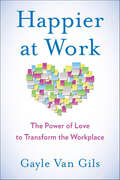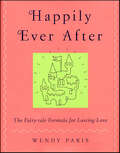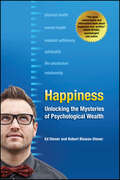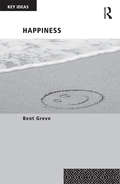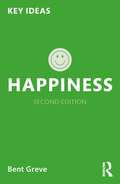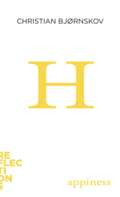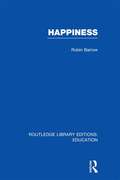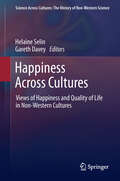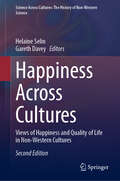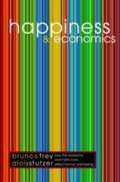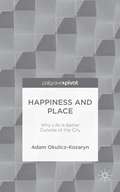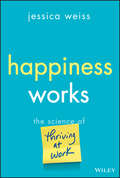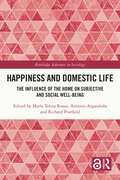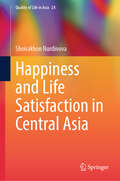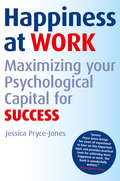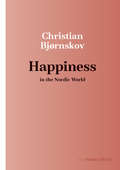- Table View
- List View
Hands-On Reinforcement Learning with Python: Master reinforcement and deep reinforcement learning using OpenAI Gym and TensorFlow
by Sudharsan RavichandiranA hands-on guide enriched with examples to master deep reinforcement learning algorithms with PythonKey FeaturesYour entry point into the world of artificial intelligence using the power of PythonAn example-rich guide to master various RL and DRL algorithmsExplore various state-of-the-art architectures along with mathBook DescriptionReinforcement Learning (RL) is the trending and most promising branch of artificial intelligence. Hands-On Reinforcement learning with Python will help you master not only the basic reinforcement learning algorithms but also the advanced deep reinforcement learning algorithms.The book starts with an introduction to Reinforcement Learning followed by OpenAI Gym, and TensorFlow. You will then explore various RL algorithms and concepts, such as Markov Decision Process, Monte Carlo methods, and dynamic programming, including value and policy iteration. This example-rich guide will introduce you to deep reinforcement learning algorithms, such as Dueling DQN, DRQN, A3C, PPO, and TRPO. You will also learn about imagination-augmented agents, learning from human preference, DQfD, HER, and many more of the recent advancements in reinforcement learning.By the end of the book, you will have all the knowledge and experience needed to implement reinforcement learning and deep reinforcement learning in your projects, and you will be all set to enter the world of artificial intelligence.What you will learnUnderstand the basics of reinforcement learning methods, algorithms, and elementsTrain an agent to walk using OpenAI Gym and TensorflowUnderstand the Markov Decision Process, Bellman’s optimality, and TD learningSolve multi-armed-bandit problems using various algorithmsMaster deep learning algorithms, such as RNN, LSTM, and CNN with applicationsBuild intelligent agents using the DRQN algorithm to play the Doom gameTeach agents to play the Lunar Lander game using DDPGTrain an agent to win a car racing game using dueling DQNWho this book is forIf you’re a machine learning developer or deep learning enthusiast interested in artificial intelligence and want to learn about reinforcement learning from scratch, this book is for you. Some knowledge of linear algebra, calculus, and the Python programming language will help you understand the concepts covered in this book.
Hanging Out: The Radical Power of Killing Time
by Sheila LimingA smart and empowering book about the simple art of hanging out ... and of taking back our social lives from the deadening whirl of contemporary life.Almost every day it seems that our world becomes more fractured, more digital, and more chaotic. Sheila Liming has the answer: we need to hang out more. Starting with the assumption that play is to children as hanging out is to adults, Liming makes a brilliant case for the necessity of unstructured social time as a key element of our cultural vitality. The book asks questions like what is hanging out? why is it important? why do we do it? how do we do it? and examines the various ways we hang out—in groups, online, at parties, at work. Hanging Out: The Radical Power of Killing Time makes an intelligent case for the importance of this most casual of social structures, and shows us how just getting together can be a potent act of resistance all on its own.
Hanging in There: The G7 and G8 Summit in Maturity and Renewal (Routledge Revivals)
by Nicholas BayneThis title was first published in 2000: This inside look at the G7/G8 summits is from an author who combines personal experience of the summit process with academic analysis. It weaves together a critical narrative of the annual summits with essays on their interaction with contemporary trends - interdependence, globalization and the end of the Cold War - and with key international institutions. the summits are judged against their original objectives: reconciling domestic and external pressures, mobilizing collective management and providing political leadership. Readers should take away an understanding of how the leaders of the major industrial democracies have responded to the transformation of the world economy during the late 20th century and how far they have succeeded in reforming the international economic system to meet the next millennium.
Hannah Arendt and Education: Renewing our Common World
by Mordechai Gordon"Hannah Arendt And Education: Renewing Our Common Worlda"is the first book to bring together a collection of essays on Hannah Arendt and education. The contributors contend that Arendt offers a unique perspective, one which enhances the liberal and critical traditions'' call for transforming education so that it can foster the values of democratic citizenship and social justice. They focus on a wide array of Arendtian conceptsOCosuch as natality, action, freedom, public space, authority and judgmentOCowhich are particularly relevant for education in a democratic society. Teachers, educators, and citizens in general who are interested in democratic or civic education would benefit from reading this book. "
Hannah Arendt: The Promise of Education (SpringerBriefs in Education)
by Jon NixonThis book gathers some of Hannah Arendt’s core themes and focuses them on the question, ‘What is education for?’ For Arendt, as for Aristotle, education is the means whereby we achieve personal autonomy through the exercise of independent judgement, attain adulthood through the recognition of others as equal but different, gain a sense of citizenship through the assumption of our civic rights and responsibilities, and realize our full potential as sentient beings with the capacity for human ‘flourishing’ and ‘happiness’ (eudaimonia). In order to appreciate the pivotal role that education plays in Arendt’s analysis of the human condition, we have to understand the emphasis she placed on ‘thoughtfulness’, as the measure of our humanity and on ‘thoughtlessness’, as the measure of our inhumanity. Education sustains and develops the human capacity: to think together (phronesis), to think for oneself (what Arendt called ‘the two-in-one’ of thinking), and to think from the point of view of others (what she termed ‘representative thinking’). From the developing constellation of ideas embedded in her vast and varied body of work, the author infers a notion of education as a necessary preparation for personal fulfillment, social engagement, and civic participation.
Hannah Mary Tabbs and the Disembodied Torso: A Tale of Race, Sex, and Violence in America
by Kali Nicole GrossShortly after a dismembered torso was discovered by a pond outside Philadelphia in 1887, investigators homed in on two suspects: Hannah Mary Tabbs, a married, working class, black woman, and George Wilson, a former neighbor that Tabbs implicated after her arrest. As details surrounding the shocking case emerged, both the crime and ensuing trial - which spanned several months - were featured in the national press. The trial brought otherwise taboo subjects such as illicit sex, adultery, and domestic violence in the black community to public attention. At the same time, the mixed race of the victim and one of his assailants exacerbated anxieties over the purity of whiteness in the post-Reconstruction era. In Hannah Mary Tabbs and the Disembodied Torso, historian Kali Nicole Gross uses detectives' notes, trial and prison records, local newspapers, and other archival documents to reconstruct this ghastly who-done-it true crime in all its scandalous detail. In doing so, she gives the crime context by analyzing it against broader evidence of police treatment of black suspects and violence within the black community. A fascinating work of historical recreation, Hannah Mary Tabbs and the Disembodied Torso is sure to captivate anyone interested in true crime, adulterous love-triangles gone wrong, and the racially volatile world of post-Reconstruction Philadelphia.
Hans J. Morgenthau und die Twenty Years‘ Crisis: Das realistische Denken eines Emigranten im Lichte seines deutschen Erfahrungshintergrundes
by Alexander ReichweinAlexander Reichwein stellt in diesem Buch die realistische Theorie Hans J. Morgenthaus in den Kontext der deutschen Geschichte. Dabei vertritt er die These eines sinnstiftenden Zusammenhangs zwischen der Sozialisation und dem Denken des in Frankfurt promovierten Völkerrechtlers und späteren Politikwissenschaftlers. Reichwein argumentiert, dass erst das Wissen um Morgenthaus soziales und intellektuelles Umfeld, seinen persönlichen und akademischen Werdegang und die politischen Ereignisse in Europa in den Zwischenkriegsjahren den Schlüssel zum Verständnis seines Weltbildes bieten, das sich nicht auf ein affirmatives Verständnis von Macht reduzieren lässt. Morgenthaus Denken offenbart liberale Grundüberzeugungen, einen normativen Kern und Lehren aus der Vergangenheit, die in seiner Kritik an der US-Außenpolitik sowie in seinen Arbeiten zur Demokratie in Amerika zum Ausdruck kommen. Und die sich wie eine Warnung vor einer kriegerischen Außenpolitik, Nationalismus und einem zweiten Weimar lesen lassen.
Hans Mol and the Sociology of Religion (Routledge Studies in Religion)
by Adam J. PowellHans Mol was born in the Netherlands during the 1920s. His imprisonment by the Gestapo during World War II began a long intellectual journey, exploring the role of religion in society. His work on the sociology of religion throughout the 20th and 21st Century is distinctive in its quest for both methodological and existential balance Part One of this book includes a brief outline of Mol’s most influential theory as originally explicated in Identity and the Sacred (1976). This is followed by a look at the initial reception of that theory in relation to the competing concepts of Mol’s contemporaries. Part Two is comprised of four previously-unpublished essays written by Mol during the 70s and 80s. Covering topics from evolution to evangelicalism, the papers display the sweeping ambition of this sociologist as well as the tone and contours of his intellectual articulation. In the Postscript this volume concludes with select transcripts of interviews conducted between Adam Powell and Hans Mol during the Spring of 2012. This volume of Mol’s work will be of keen interest to academics and students with an interest in the sociology of religion post-World War II and the development of contemporary Christian theology.
Hapa Girl: A Memoir
by Chai May-LeeIn the mid-1960s, Winberg Chai, a young academic and the son of Chinese immigrants, married an Irish-American artist. InHapa Girl("hapa" is Hawaiian for "mixed"), their daughter tells the story of this loving family as they moved from Southern California to New York to a South Dakota farm by the 1980s. In their new Midwestern home, the family finds itself the object of unwelcome attention, which swiftly escalates to violence.
Happier at Work: The Power of Love to Transform the Workplace
by Gayle Van GilsThe American workplace has become toxic to mental, emotional, and physical health. A book for our complex and challenging times, Happier at Work offers a practical path for leaders and employees to shift a culture of fear and reactivity to one of communication and collaboration. Mindfulness and compassion come naturally to all of us, as does a fundamental goodness; in these pages, readers will discover how to access that true nature. Van Gils also explores the science behind practices that not only decrease stress, overwhelm, and chronic illness but also develop authentic, emotionally fit leaders and a compassionate workplace. Accessible and inspiring, Happier at Work is a guide to a transformed workplace—one of enhanced creativity, innovation, engagement, performance, and joy!
Happily Ever After: The Fairy-tale Formula for Lasting Love
by Wendy ParisFind Your Inner Princess and Live Happily Ever AfterDon't let anyone tell you true love is a fairy tale. You can find the romance of your dreams, and this book will tell you how.In Happily Ever After, author Wendy Paris offers a contemporary spin on ten classic fairy tales, going behind the scenes with these legendary romantic heroines to show what they did to live happily ever after. Contrary to popular belief, fairy-tale heroines are not weak and passive. They are noble, brave, optimistic women who know that the formula for success in a chaotic world is to hold fast to their own beliefs despite what fate happens to throw their way. Ultimately, it is their character that saves them, not the prince on the white horse.Take Cinderella, for example. Despite having a less than ideal job, she didn't let bitterness and regret give her an ulcer, bad skin, and frown wrinkles. She knew "cinder maid" was a job title, not a life description.She didn't hide in her carriage, crying, "I can't go to the ball by myself! Everyone will think I'm a loser! " She had the courage to attend a party alone.At the stroke of midnight, she didn't cling to the prince's hand and wail, "Save me from my miserable life!" She had the confidence to know that if he liked her, he'd come calling.This humorous, heartfelt book shows women how to focus on their strengths and character rather than resort to manipulative strategies to "land" a man. The perfect antidote to negative dating guides that just don't work, Happily Ever After offers practical, empowering advice that's been proven effective for the last 500 years and is still relevant today.
Happiness
by Robert Biswas-Diener Ed DienerUtilizing sophisticated methodology and three decades of research by the world's leading expert on happiness, Happiness challenges the present thinking of the causes and consequences of happiness and redefines our modern notions of happiness. shares the results of three decades of research on our notions of happinesscovers the most important advances in our understanding of happinessoffers readers unparalleled access to the world's leading experts on happinessprovides "real world" examples that will resonate with general readers as well as scholarsWinner of the 2008 PSP Prose Award for Excellence in Psychology, Professional and Scholarly Publishing Division of the Association of American Publishers
Happiness (Key Ideas)
by Bent GreveAlthough happiness is based upon individuals’ subjective perception of their own situation, understanding the concept of happiness is important for forming policies in modern societies. Taking into account discussions from disciplines across the social sciences, this book explores varying notions of happiness and how these are applied to create a theoretical understanding of the concept. The book then goes on to demonstrate how a general theoretical concept of happiness can be used to add to our knowledge of central aspects of modern society, ranging from questions related to welfare state analysis, through to evaluating everyday life for individual people. In doing so, Happiness presents an up-to-date and applied account of how happiness is now widely used in economics, sociology, psychology and political science, whilst also exploring the relationship between happiness and public policy.
Happiness (Key Ideas)
by Bent GreveThis fully revised and updated edition of Happiness provides an accessible introduction to the concept of happiness and how it can be applied to public policy in order to help citizens achieve the good life. Countries around the globe want to ensure the best for their citizens. They want them to be happy, have a good life and improve their well-being. It follows that, whilst happiness is based upon individuals’ subjective perception of their own situation, it is important to understand the concept of happiness in order to form policies that might help individuals to achieve what they believe will make them happier. Applying approaches from disciplines across the social sciences, this book explores varying notions of happiness and how these can be applied to create a theoretical understanding of happiness as a concept. The book then demonstrates how the concept of happiness can be used to analyse social policy in welfare states in areas including work, health and migration, as well as to evaluate everyday life and social relationships. This book will be essential reading for students and instructors in a range of subjects in the humanities and social sciences with an interest in the concept of happiness and/or welfare states.
Happiness (Reflections)
by Christian BjørnskovA short but engaging look at how the key to our own happiness may lie with other people.Why is Denmark consistently ranked one of the happiest nations? In Happiness, researcher Christian Bjørnskov explores what we mean when we talk about happiness. Based on new research findings on how people perceive their own lives, Bjørnskov argues that the basic factors that constitute happiness are mostly universal across cultures. By evaluating studies and theories on happiness that test how family, genetics, religion, wealth, work, and trust factor into our happiness as well as how often we smile or compare ourselves to others, Bjørnskov outlines why our most important source of happiness may be the people around us. ReflectionsIn Reflections, a series copublished with Denmark's Aarhus University Press, scholars deliver 60-page reflections on a key concept that encapsulates their years of study and research. These books present unique insights on a wide range of topics and concepts—everything from love, trust, and play, to corruption, welfare, and sleep—that entertain and enlighten readers with exciting discoveries and new perspectives.
Happiness (Routledge Library Editions: Education)
by Robin BarrowThe first part of the book reviews empirical work relating to happiness (including attitudinal studies), claims made in an educational context and postwar philosophical treatment of the concept. There is a useful account of Aristotle’s pioneering work and a stimulating summary of some of the main themes to be found in the literature concerning happiness. In the second part the author elucidates the concept of happiness, and consider the significance, reliability and plausibility of the various empirical claims in the light of a clear understanding of what happiness is. After discussing whether happiness ought to be valued in general terms the study concludes by outlining the ways in which it can be related to education and schooling and by suggesting action which could be taken in schools in order to promote happiness.
Happiness Across Cultures
by Helaine Selin Gareth DaveyDifferent cultures experience happiness differently. Traditionally, the West is considered materialistic, and happiness is said to come from achievement and acquisition. The East is said to be more people-oriented, where happiness is a result of deep personal interactions. Thus, poor people can be happier in the East than the West, because they are not so concerned with possession and more with society. This book considers happiness and quality of life in non-Western countries and cultures. Its coverage is diverse and spans the breadth of the non-Western world, revealing unique perspectives of happiness and life quality embedded in rich cultural traditions and histories.
Happiness Across Cultures: Views of Happiness and Quality of Life in Non-Western Cultures (Science Across Cultures: The History of Non-Western Science #6)
by Helaine Selin Gareth DaveyThis second edition of Happiness Across Cultures contains 8 brand new chapters on previously uncovered topics, such as Covid19, refugees, and violence. Different cultures experience happiness differently. Traditionally, the West is considered materialistic, and happiness is said to come from achievement and acquisition. The East is said to be more people-oriented, where happiness is a result of deep personal interactions. Thus, poor people can be happier in the East than the West, because they are not so concerned with possession and more with society. This new edition considers happiness and quality of life in non-Western countries and cultures. Its coverage is now more diverse and spans the breadth of the non-Western world, revealing unique perspectives of happiness and life quality embedded in rich cultural traditions and histories.
Happiness And Economics: How the Economy and Institutions Affect Human Well-Being
by Bruno S. Frey Alois StutzerCuriously, economists, whose discipline has much to do with human well-being, have shied away from factoring the study of happiness into their work. Happiness, they might say, is an ''unscientific'' concept. This is the first book to establish empirically the link between happiness and economics--and between happiness and democracy. Two respected economists, Bruno S. Frey and Alois Stutzer, integrate insights and findings from psychology, where attempts to measure quality of life are well-documented, as well as from sociology and political science. They demonstrate how micro- and macro-economic conditions in the form of income, unemployment, and inflation affect happiness. The research is centered on Switzerland, whose varying degrees of direct democracy from one canton to another, all within a single economy, allow for political effects to be isolated from economic effects.
Happiness And Place: Why Life Is Better Outside Of The City
by Adam Okulicz-KozarynHappiness and Place is about places—cities, suburbs and towns—and happiness of people living there. Taking an interdisciplinary, approach, Okulicz-Kozaryn examines the relationship between human happiness and the infrastructure of the places they live in. The work takes the increasing urbanization of the Unites States as its focus, but draws on global examples, discussing the factors that attract people to live in cities and suburbs and the decreasing happiness associated with that lifestyle. Amidst the common pro-urbanism or pro-sub-urbanism, this thought-provoking book argues for the often overlooked idea that we are happiest in smaller areas.
Happiness Works: The Science of Thriving at Work
by Jessica WeissA proven five-step framework to overcome the most pressing challenges in the modern workplace At a time when American workplaces are in crisis, Happiness Works: The Science of Thriving at Work delivers a five-step framework to address the growing challenges they face, including the complexities of hybrid/remote work, rising mental health concerns, and a pervasive sense of disconnection and disengagement. Rooted in the latest research on psychology, this book offers a view of happiness at work that goes beyond hacks, cliches, and platitudes, enabling readers to create more inclusive, engaging, and ultimately more successful team environments. Drawing on author Jessica Weiss's 15 years of leadership, culture, and organizational development consulting experience for some of the country's most prestigious organizations including Coca-Cola and Johnson & Johnson, this book explores concepts including: Fairness, transparency, and a help-others attitude as essential requisites to happiness habits and strategies Positivity and resilience as tools to manage negative thoughts and emotions The importance of friends at work A new concept of a To-Do List, focusing exclusively on what you got done The power of savoring the moment as a strategy to rewrite neural pathways for happiness Thought-provoking and highly practical at every turn of the page, Happiness Works earns a well-deserved spot on the bookshelves of all professionals and leaders seeking real solutions to some of the most pressing problems in the workplace today.
Happiness and Domestic Life: The Influence of the Home on Subjective and Social Well-being (Routledge Advances in Sociology)
by Maria Teresa RussoThis book uses a multidisciplinary approach to examine the relationship between the quality of domestic life and the home environment, in its material and relational dimension, with individual and social happiness, in the context of current changes. The theme of happiness and wellbeing is framed within two significant changes, themselves affected by the recent COVID-19 pandemic: the relationship between the individual’s quality of life and engagement within the community, and the role of new technologies in everyday life. The authors highlight the relational nature of happiness and the centrality of the home environment in its promotion. Three dimensions of psychosocial wellbeing in the home are analysed: the personal one, consisting of a sense of stability, intimacy and sharing; the social one, which considers the domestic environment as a place for civic education and, in times of pandemic, the site of professional activity; and the physical one, consisting of spaces, services and architectural styles. This book is ideal for readers who wish to cross disciplinary boundaries and explore the topic of domestic happiness in its different facets. The target audience is both professional researchers and advanced graduate and undergraduate students.
Happiness and Life Satisfaction in Central Asia (Quality of Life in Asia #24)
by Shoirakhon NurdinovaThis book offers the first comprehensive examination of life satisfaction and happiness in Central Asia from an empirical and comparative perspective. Drawing on econometric models, it reveals how economic conditions, gender, culture, and social norms shape subjective well-being in Kazakhstan, Kyrgyzstan, Tajikistan, Turkmenistan, and Uzbekistan. The findings provide insights into the complex structure of quality of life in a region that has received little attention in happiness research. As such, the book makes a pioneering contribution to the study of well-being in Central Asia and serves as a valuable resource for scholars, policymakers, and researchers interested in happiness-oriented development and the determinants of well-being worldwide.
Happiness at Work
by Jessica Pryce-JonesSharing the results of her four-year research journey in simple, jargon-free language, Pryce-Jones exposes the secrets of being happy at work.Focuses on what happiness really means in a work context and why it matters to individuals and organisations in both human and financial termsEquips readers with the information, knowledge and skills to make the most of the nearly 100,000 hours that they'll spend at work over a lifetimeDemystifies psychological research through a fascinating array of anecdotes, case studies, and interviews from people in the trenches of the working world, including business world-leaders, politicians, particle physicists, and philosophers, sheep farmers, waitresses, journalists, teachers, and lawyers, to name just a few
Happiness in the Nordic World (Nordic World)
by Christian BjørnskovDenmark is consistently among the countries with the happiest and most satisfied populations, and it regularly places at the very top with the rest of the Nordic countries in international surveys. Why do the Nordic countries as a whole constitute the happiest region in the world? Many experts attribute the region's high levels of happiness to factors such as greater relative national wealth and well-functioning institutions. Yet, a number of other countries in Europe and parts of Asia share those qualities and rank far lower in life satisfaction. Others credit the region's high levels of happiness to its welfare state model, but these have changed considerably over time—and Iceland does not share this feature. Instead, economist Christian Bjørnskov argues that the most important factor to come out of international comparisons is the importance of social trust—the ability to trust other people one does not know personally. The populations in three of the five countries are also characterized by a very strong sense of personal freedom. These two key factors contribute to a fuller and richer life. Bjørnskov ends by discussing to what extent these factors can be exported to other parts of the world.
